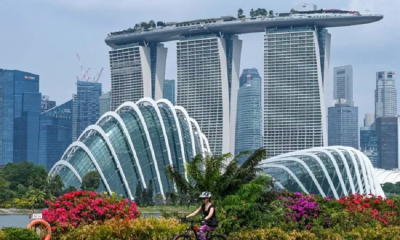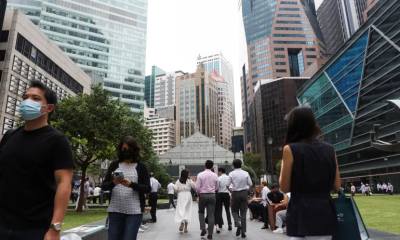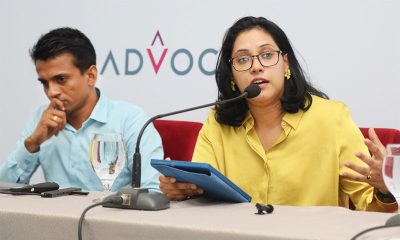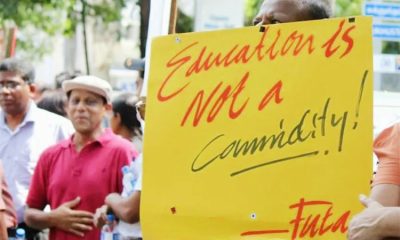Editorial
Neutralise this threat to democracy

Wednesday 28th December, 2022
Reports that the Election Commission will have to hold the local government elections soon have upset government politicians beyond measure; they are delivering jeremiads against what they call unnecessary state expenditure amidst an economic crisis. Claiming that the mini polls will cost the country Rs. 10 billion, they would have the public believe that they are ready to face an election anytime, but the advisability of holding an electoral contest at this juncture is in question, and government expenditure should be rationalised! If elections are to be postponed in view of the economic crisis, as these grandees suggest, then the people will have to wait till kingdom come to exercise their franchise again. Is it that the government wants the local government authorities to go the same way as the Provincial Councils, which have been without elected members for years?
Nothing is scarier for the unpopular ruling party politicians than the prospect of having to go before the people, having bankrupted the economy and caused so much suffering to the latter. None of these worthies in his or her proper senses will undertake a house-to-house canvass. The people are blind with rage, and how they will react when the next power tariff hike takes effect is not difficult to imagine.
Supposing the government politicians’ call for frugal management of public finance is genuine, there are many ways in which the taxpayers’ money could be prevented from going down the gurgler. It costs the taxpayer an arm and a leg to maintain the huge parliamentary complex. Most MPs are absent when Parliament is in session, and the Speaker is hard put to hold quorate sittings. A great deal of public funds could be saved if the number of MPs is reduced constitutionally, and Parliament is shifted where it originally was, with the current parliamentary complex being utilised for an income generating project. Our honourable MPs should emulate their Swedish counterparts, who are not allowed to live high on the hog at the expense of taxpayers. In Sweden, the MPs are given bus and train passes, and even ministers have to travel by public transport, and if they use private vehicles, they have to do so at their own expense.
Neither politicians—the President and the Prime Minister included—nor public officials should be allowed to travel first/business class at the expense of taxpayers when they go overseas; they must not be allowed to stay in penthouse suites or enjoy other such luxuries. They should be given economy class tickets and put up in ordinary hotels. Those who are responsible for bankrupting the country must not be allowed to live the high life while the people are suffering. Let them be made to practise austerity. The leaders of a country that has defaulted on its debt and is begging for funds from the rest of the world must not be allowed to live like kings, must they?
Why don’t the government MPs who claim to be so concerned about how public funds are spent bring pressure to bear on the government to recover massive losses the Treasury has suffered due to the sugar tax scam? UNP General Secretary Palitha Range Bandara told the media, at Sirikotha, on 10 March 2021, that the sugar tax scam had caused a loss of Rs. 16 billion to the state; he asked the then President Gotabaya Rajapaksa to take action to recover the money. Today, Bandara’s boss, Ranil Wickremesinghe, is the President, and he should renew his call! In September 2019, MP Mahinda Yapa Abeywardene told Parliament that a state bank had written off a loan given to UNP financier, Daya Gamaga, who was a state minister at the time, and suffered a loss of Rs. 5 billion, as a result. The assets of the state banks belong to the public, and therefore the UNP ought to ensure that its members including Gamage pay back their loans. Besides, all MPs including ministers must pay their electricity and water bills, and stop using their gas-guzzling SUVs such as V-8s to help the country save forex.
Justice Minister Wijeyadasa Rajapaksha has reiterated that some unscrupulous Sri Lankan exporters have parked as much as USD 53 billion illegally overseas. Why don’t the government MPs urge the President to take action to ensure that at least part of this amount will be repatriated? If a fraction of the stolen public funds is traced and confiscated, the country’s pecuniary woes will disappear in next to no time.
A government that fears elections and postpones them on one pretext or another is a grave threat to democracy and must be sent packing as soon as possible for the sake of democracy.
Editorial
Rapacious rogues

Thursday 18th April, 2024
Tourist arrivals are on the increase, according to the Sri Lanka Tourism Development Authority. Prestigious international travel guides are very generously promoting Sri Lanka as a must-visit tourist destination. Lonely Planet says ‘endless beaches, timeless ruins, welcoming people, oodles of elephants, rolling surf, cheap prices, fun trains, famous tea and flavourful food make Sri Lanka irresistible’. The New York Times has ranked Negombo as one of the ‘52 Places to Go in 2024’. There have been numerous rave reviews, in international travel publications, about tourist attractions in Sri Lanka. But all it takes to spoil a pot of milk is said to be a smidgeon of cow dung.
A couple of videos doing the rounds on the Internet have exposed some eatery owners’ unspeakably exploitative practices such as overcharging foreign tourists and verbally abusing them. One of them is seen threatening a foreign tourist, who refuses to pay as much as Rs. 1,900 for a kottu roti, in Colombo. He was arrested on Tuesday and released on bail yesterday. The police deserve praise for prompt action.
Eatery owners are not alone in exploiting foreign tourists and hurling abuse at them; some taxi operators also exact exorbitant amounts as fare from unsuspecting foreigners, who are without anyone to turn to. Numerically insignificant as such uncivilised, greedy elements who turn aggressive and abusive at the drop of a hat may be, their sordid operations tarnish the image of the country. This is something that the state institutions tasked with promoting tourism, and all those who are engaged in the hospitality industry ought to take cognizance of.
It must be made mandatory for prices to be prominently displayed in all business places to prevent customers, including foreign tourists, from falling prey to unscrupulous businesspersons. Taxis must not be allowed to operate unless they are equipped with tamper-proof fare meters, and information about their drivers is displayed, as in countries like Singapore. The need for all taxies including trishaws to be strictly regulated to protect the rights of commuters cannot be overemphasised. Ride-hailing companies may be the best option for foreign tourists, who seek hassle-free travel.
Sri Lankans themselves suffer savage exploitation at the hands of rapacious businesses. There are various organisations representing the interests of the business community. They are making multiple demands ranging from debt moratoriums to the suspension of parate executions. They, no doubt, deserve relief and a leg-up to regain stability in these hard times, but they must be mindful of their responsibilities.
It is incumbent upon them to ensure that their members refrain from unethical practices that bring the entire business community into disrepute. They are responsible for the so-called ‘greedflation’, which has caused the prices of commodities and services to remain extremely high despite a significant decrease in the inflation rate.
Business leaders never miss an opportunity to pontificate to politicians about the virtues of transparency, integrity, etc., but shouldn’t they put their house in order before being critical of others. The rupee has been rallying against the US dollar, during the past several weeks, and the cost of production has decreased significantly, but the prices of essential commodities are increasing. Eatery owners and bakers are among those who are making a killing at the expense of the public.
The Consumer Affairs Authority is in a deep slumber, as is its wont, and it must be shaken awake and made to carry out its duties and functions diligently. It needs a radical shake-up, for some of its officials are believed to be compromised. Its much-publicised raids have stopped and traders are exploiting the public with impunity. The victims of fleecing have no alternative but to suffer in silence, and foreign travellers’ predicament is even worse for obvious reasons.
The government spends colossal amounts of state funds on tourism promotion events overseas. While such gimmicks may be necessary to attract tourists, many issues remain unaddressed at home. There is a pressing need to take stringent action against the rapacious rogues preying on foreign tourists and Sri Lankans alike.
Editorial
Self-proclaimed messiahs

Wednesday 17th April, 2024
The SJB and the JVP-led NPP have been challenging each other to a debate on the economy, for the past several weeks. They are like two boisterous tipplers engaged in a shebeen brawl. The NPP is said to be trying to drag President Ranil Wickremesinghe also into the debate, which is not likely to take place before the next presidential election.
President Wickremesinghe has already unveiled his economic recovery plan for all practical purposes. In fact, he is implementing it and has shown some tangible results. He has made quite a few unpopular decisions to straighten up the economy; the political fallout thereof has become grist for the mill where the Opposition is concerned.
The SJB and the NPP have been shedding copious tears for the public and promising to deliver them from their suffering. It looks as if they were competing with each other to make the highest number of promises in the shortest possible time. Both of them have pledged to bring the cost of living down, and grant relief to the public. But they will not reveal how they are going to do so without derailing the ongoing efforts to rebuild the economy. They are blowing hot and cold on the IMF bailout programme, which hurts the public but is a prerequisite for economic recovery. They would have us believe that they will renegotiate the IMF programme, if they are voted into office, but there is no guarantee that they will succeed in their endeavour. They have stopped short of revealing what they intend to do in case the IMF refuses to renegotiate bailout terms.
There is no gainsaying that the SLPP-UNP government has become a metaphor for corruption and ineptitude, and it will have to rid itself of the corrupt elements in its ranks and mend its ways if it is to be able to revitalise the economy. But that does not mean its rivals are paragons of virtue and mavens capable of turning the economy around overnight.
The Yahapalana government (2015-2019) failed mainly because its ministers could not run their ministries properly, much less live up to the people’s expectations. Many of them are currently in the SJB, whose seniors also have a history of defending the corrupt; they unflinchingly backed the Treasury bond racketeers to the hilt. They are also responsible for the reckless borrowing during the Yahapalana government, in which they were Cabinet ministers. That regime issued International Sovereign Bonds to the tune of more than USD 10 billion, according to former President Mahinda Rajapaksa. Thus, the SJB worthies, too, have made a huge contribution to the country’s debt burden.
The JVP claims to be able to govern the country and manage the economy better than any other party. But it is caught up in a duality of socialism and capitalism. It has not abandoned its original Revolutionary Policy Declaration based on Marxist ideals. It will have to sort out its economic policy contradictions and explain why it failed to retain control over the Tissamaharama Pradeshiya Sabha (PS), which it won more than two decades ago by promising to turn it into a model local government authority. If it had run that PS to the satisfaction of the public, it would have been able to remain unbeaten therein. So, the biggest challenge before the JVP will be to convince the public that it is equal to the much bigger task of governing the country and resolving the economic crisis. Talking the talk is one thing, but walking the walk is quite another.
Political parties are notorious for infusing the public with false hopes ahead of elections. The SLFP once went to the extent of promising ‘rice from the moon’ to win elections. So, the season of promises has dawned with only a few months to go before the next presidential election.
One can only hope that the people, who are usually easy prey for crafty politicians, will act wisely and make rational decisions when they vote next time. But this is a country where tens of thousand of people, including the so-called educated ones, flocked to a faraway village, a few years ago, and jostled and shoved to secure bottles of Dhammika peniya, a kind of herbal syrup, produced by a carpenter-turned shaman, and touted as a cure for Covid-19. There’s the rub.
Editorial
A Norwegian example worthy of emulation

Tuesday 16th April, 2024
Ruling party politicians in Sri Lanka are unarguably more equal than others, like the Pigs in Orwell’s Animal Farm, but their counterparts in the developed world are not so lucky. Not that all politicians in the so-called five-star democracies are much better than the ones we are burdened with; the developed nations, too, have tainted politicians to contend with, but never can such characters rise above the law.
Norway’s Health Minister Ingvild Kjerkol had to resign the other day. What prompted her to step down had nothing to do with malpractices in the health sector under her purview. She had to resign owing to an allegation that she had plagiarised some academic works in her Master’s thesis, submitted in 2021. No sooner had Nord University launched a probe into the allegation against her than she tendered her resignation. She did so at the behest of Prime Minister Jonas Gahr Støre.
Going by the stern action the Norwegian government has taken against Kjerkol over a plagiarism allegation, it is not difficult to imagine what would have befallen her if she had been accused of being involved in a procurement racket at the expense of the lives of patients and the public purse. This is in sharp contrast to the manner in which the government of Sri Lanka has chosen to act in respect of the prosecution of its former Health Minister.
Keheliya Rambukwella remains a Cabinet minister in spite of facing prosecution and being held on remand for a procurement racket carried out on his watch as the Minister of Health. The allegation against Kjerkol pales into insignificance in comparison to the charges against Rambukwella, the most damning one being the purchase of a consignment of fake immunoglobulin, which has reportedly claimed several lives in government hospitals and caused huge losses to the state coffers. Having failed to prevent the prosecution of Rambukwella, the Wickremesinghe-Rajapaksa government is now doing everything in its power to make his stay in remand prison comfortable. The government unashamedly defended Rambukwella when a motion of no confidence was moved against him last year.
Curiously, the Prison Department experiences a shortage of buses whenever it has to take Rambukwella to court, and uses a van to transport him! Politicians with links to the government in power never languish in crowded cells in remand prisons; they stay in prison hospitals, instead.
Kjerkol is not alone in her predicament. Plagiarism has cost another Norwegian politician her Cabinet post. In January, 2024, Norwegian Minister of Research and Higher Education Sandra Borch had to resign when it was revealed that some sections of her Master’s thesis had been plagiarised. She lost her degree as a result. In this country, politicians’ children are said to be able to sit examinations, unsupervised, in separate rooms, where they receive help from their private tutors to answer questions, pass out and practise law, of all things.
Last year, Prime Minister Støre dismissed Norway’s Foreign Minister Anniken Huitfeldt, whose husband was exposed for making questionable financial deals that could have had some influence on her ministerial duties. Several other Norwegian ministers have also had to step down over allegations of various malpractices. Such is Norway’s determination to ensure the probity and integrity of its politicians.
President Ranil Wickremesinghe, who is the head of government, is known for his affinity for Norwegians. He went so far as to involve them in conflict resolution here in the early noughties though they were accused of being partial to the LTTE. Special Norwegian peace envoy, Erik Solheim, made no bones about his partiality to the LTTE, but President Wickremesinghe has appointed him a Presidential Advisor on Climate Change. Shouldn’t Wickremesinghe emulate Norwegian PM Støre and remove Rambukwella from the Cabinet forthwith?
Most of all, how can Sri Lanka’s creditors, whose consent for external debt restructuring is a prerequisite for economic revival here, be expected to repose trust in a government, which allows its members to enrich themselves at the expense of the public and the state coffers, and even function as members of the Cabinet from behind bars?
-

 News5 days ago
News5 days agoSinhala and Tamil New Year auspicious times
-

 Business6 days ago
Business6 days agoThe $2bn dirty-money case that rocked Singapore
-

 Foreign News6 days ago
Foreign News6 days agoSingapore tightens rules for expat workers with an eye on local discontent
-

 Business2 days ago
Business2 days agoSOEs seen as failing SL’s ordinary citizens
-

 News3 days ago
News3 days agoSay no to NEPF! Say no to abolishing free education!
-

 News5 days ago
News5 days ago123rd Birth anniversary of Dr S A Wickramasinghe commemorated
-

 Business2 days ago
Business2 days agoSri Lanka Tourism concludes another round of Roadshows in Australia
-

 Foreign News5 days ago
Foreign News5 days agoNigeria first country to introduce ‘revolutionary’ meningitis vaccine



























